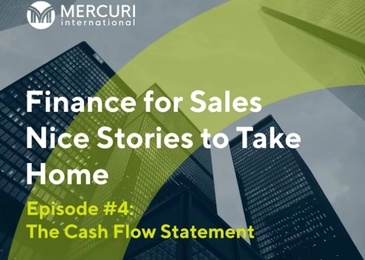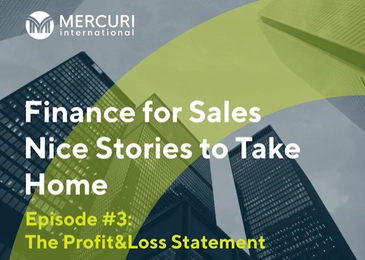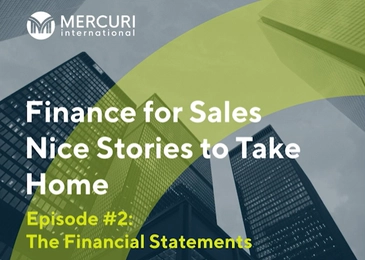On November 18th, The Sales Conference 2021 was held at the Avicii Arena in Stockholm, with hundreds of in person attendees, thousands viewing online, and 7 truly world class keynote speakers. This is how we remember the event.
What makes a great event? Is it the speakers? The people? The venue? Smart use of technology? The music and after party?
No. It’s all of the above.
Trends, insights, entertainment
This year’s Sales Conference 2021 was a celebration of what we’ve been missing – and an intriguing sign of what’s to come. On the one hand it was a well overdue chance for major industry figures to mingle and network in a great setting, Stockholm’s Avicii Arena, while on the other hand it was a chance to showcase that we have moved into a new reality where virtual communication is the norm – but that ‘virtual’ can still be engaging.
After last year’s online only event, this was an opportunity for Mercuri International Research to put on a show, timing the event to coincide with the release of their ambitious survey report, ‘The Future State of Sales’, a collaboration with SalesOnly and Scrive that had interviewed over 1,000 executives in 30 countries.
The report was the centrepiece of the event’s opening keynote speaker, Mercuri’s Henrik Larsson-Broman, who succinctly detailed the 10 critical trends shaping the sales industry today. Ranging from the technological to the cultural to the organizational, the report is a fascinating snapshot of an industry in flux, pivoting from a pre-pandemic sales reality to a brave new world both challengingly fast-moving and full of new opportunity.
The keynotes
But if Henrik’s prologue set the context for the event, it was the keynote speakers that followed who demonstrated the breadth of the day’s talking points – covering everything from gender politics, to polarised cultural discourse, to the evolution of technology itself, from prehistory to the metaverse (the latter in just 30 minutes…).
Here’s a brief summary of what happened after Henrik left the stage:
Ashkan Fardost gave what might have been the day’s most purely entertaining event, albeit with a profound point. Through sheer charm he managed to not alienate his audience with his opening statement “sales are dead”, which was probably a tough sell to the crowd. Over the course of a fascinating 30 minutes he expounded a theory which managed to join the dots between trance music, prehistory cave dwelling society, the implications of the invention of the printing press and why the internet is fundamentally coming full circle back to tribalism. It was a rollercoaster.
Andreas Ekström was impassioned in his attack on a polarised view of the world, suggesting a more nuanced view of the digital revolution – not the ‘either’ / ‘or’ of conventional wisdom but suggesting an ‘and’ instead. Where we have increasingly divided into two simplistic camps – the ‘free internet’ vs ‘regulation’, he broadened the scope to imagine a world where we could hold two ideas in our head at the same time…it was refreshing.
Shahrzad Kiavash gave us an object lesson in exactly what can be accomplished through sheer will and the determination never to give in, no matter how unexpected – or severe – the challenges. Now an olympic medal winning triathlete, Shahrzad had lost both legs below the knee to an illness which forced her to reassess her world view – and ultimately reinvent herself in the process.
Alexander Stubb provided a macro, geo-political perspective on the challenges we face, drawing on his experience in government as Finnish Prime MInister to put current events in context and give valuable advice as to how we should perceive past, present, and future in context – and plan accordingly.
Shefali Roy was perhaps the most sales-focused keynote of the day, offering a step-by-step guide to the pitfalls of hyperscaling – and the implications for the sales industry. What was particularly fascinating was the way in which she both acknowledged the complexities of fast-growth businesses and simplified the bottom line – “if you’re all on the same page, you’ve got a great chance of success. If you aren’t, you have none.”
Jonas Eriksson concluded the keynotes, bringing an unusual combination of business and football refereeing insights to the sales arena. What was fascinating was the degree to which the two disciplines upon which he has built his career overlapped. The people management skills that required different approaches with, say, Ronaldo and Messi translated surprisingly well into building blocks for HR…albeit with a presumably less temperamental workforce.
All this plus an overload of online breakout sessions…
The only certainty is change
What was most intriguing about The Sales Conference 2021 was not just the sheer diversity of the speakers, but also the common thread that ran throughout all their presentations. Namely that change is inevitable, swift, and unexpected (always), but can also present unique opportunities if embraced. While many of the speakers might – at first glance – not have spoken specifically about sales, the thoughts and insights were all the more powerful for their objectivity. The Sales Conference is about sales – but sales is ultimately about understanding human behaviour.
Hybrid is the future
And one thing that we left the sales event knowing about human behaviour was that, as a species, we love to interact in person. While the online event showed what is possible with the right technology and offered great engagement to those unable to attend, those there in person benefited from a long overdue opportunity to interact in person, to chat, to discuss in an impromptu way that didn’t require putting a Zoom booking in the diary.
If the event was anything, it was a sign of things to come – face to face when possible and beneficial, or making the best use of the best communication tools when not.
The future is hybrid. But it was still nice to be there in person.


